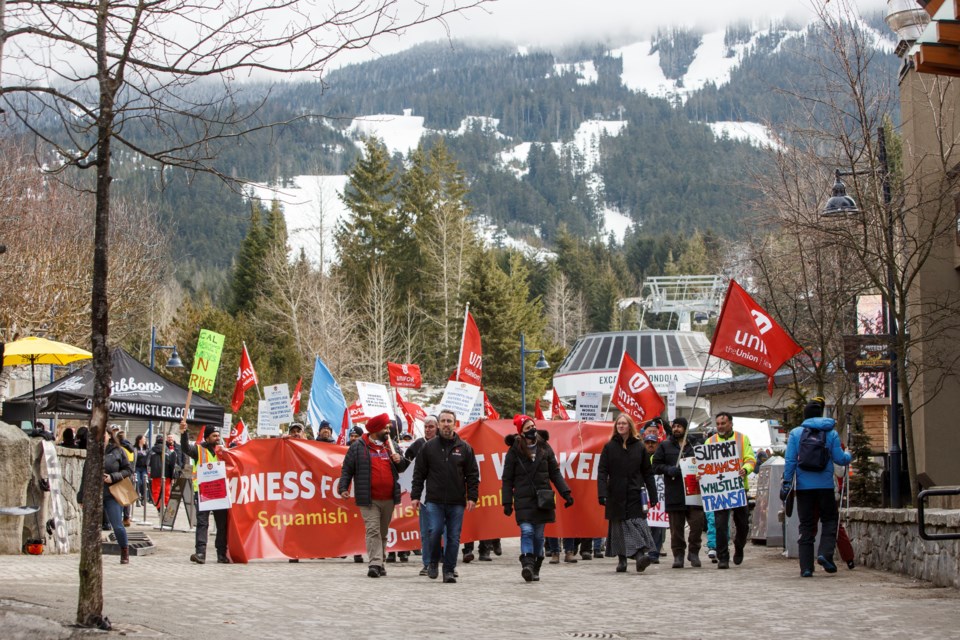Only a day after the parties , talks appear to have broken down between the union representing striking Sea to Sky transit workers and their employers.
In Friday, Feb. 25, Pacific Western Transportation (PWT)—the parent company of Whistler Transit Ltd. and Diversified Transportation in Squamish—said they met with Unifor Local 114 yesterday and proposed a settlement offer that included a wage increase for all employees in each year of the agreement, retroactive pay increases back to 2020, as well as full benefits for all employees. PWT said the union rejected the offer and declined to put it to its members for a vote. Unifor did not present a counter proposal, according to the company.
“Whistler Transit Ltd. and Diversified Transportation are disappointed in their decision and it’s the Company’s opinion that the union’s refusal to move off of their initial offer of nearly a year ago represents a lack of [earnestness] in bargaining for a reasonable deal,” PWT went on.
“We understand the impact this matter has on the community as many depend on transit, and we apologize for the inconvenience of the past few weeks. We were hopeful we could reach a resolution and felt the offer presented gives the employees a fair deal and increases wages in excess of other systems. We hope the Union reconsiders their position and returns to the table.”
Unifor’s western regional director Gavin McGarrigle told Pique the union was “disappointed” with the offer PWT put on the table, claiming the proposed wage increase remained below Canada’s 2021 current inflation rate of 5.1 per cent.
“Not much changed with the wage offer we saw this week, if at all, from what we saw last January,” he said. “Bargaining is about identifying the issues and really rolling up your sleeves to get it done and what we saw this week was unfortunately a seriously inadequate offer from the employer, a lot of game-playing, and no willingness to really get to a deal. It’s very unfortunate. We were expecting a lot more.”
Transit workers in Whistler, Pemberton and 麻豆社国产 on Jan. 29, and no talks had taken place until yesterday. The main sticking points for the union concern wages, benefits and job security, particularly in light of the high cost of living in the corridor. Unifor has contended that drivers make anywhere from $3 to $5 less than their counterparts in Vancouver and Victoria.
“We’ve indicated all along that we want to see a path to dealing with these disparities. But you can’t negotiate a path to dealing with it if you don’t recognize that the disparities exist and that they are real and they are valid,” Gavin McGarrigle, Unifor’s western regional director, told Pique on Monday, Feb. 21.
But in a rare statement last week, PWT pushed back against what it sees as “misleading and inaccurate information” around its current wage scale and compensation. “We cannot comment on any specifics of either party’s bargaining positions, [but] we encourage anyone interested to seek out the facts on wage scales, as it is all public information,” the company wrote on Feb. 21.
According to that was previously in place between Unifor and Whistler Transit, a new driver with no experience in April 2019 would have had a base hourly pay rate of $27.92, which increased by a dollar with every 600 driving hours accumulated, to a maximum rate of $31.92. A recent for a BC Transit operator in Victoria, meanwhile, lists the pay scale ranging from $21.77 after the initial training period to a maximum of $33.18 after five years of service.
McGarrigle was quick to point out, however, that compensation for Victoria transit workers—who are employed directly by BC Transit, rather than a private contractor—also comes with “a fully funded pension plan, with benefits for all, and a whole bunch of things that come with a robust collective agreement,” he said. “For us, the employer is simply being disingenuous.”
McGarrigle added that there has been “no acknowledgement on the part of this employer that comparisons with transit wages down the road at [contracted Vancouver transit operator] Coast Mountain Bus Company make sense. That’s a huge problem.”
In regards to PWT’s offer to extend full benefits to all transit employees, McGarrigle didn’t want to get into the specifics of the proposal with negotiations ongoing, but noted “there is contract language attached to all of these things. At the end of the day, they didn’t reach what we needed to see in terms of getting benefits for employees in a fair manner.” He added that this week PWT “talked about how they had philosophies opposed to pensions.”
Unifor has previously said a cap on the number of employees eligible for benefits means 38 per cent of the bargaining unit is without benefits. PWT has pushed back against this figure, although it wouldn’t say what percentage of workers is not currently covered, as it can fluctuate depending on the time of year. A company spokesperson did tell Pique this week that PWT offers a group RRSP pension plan, and said all year-round, unionized employees receive full extended health and disability benefits, in addition to a “good portion” of seasonal staff.
Unifor has been vocal about its stance on private contractors delivering public transit, which it believes lies at the root of the current dispute.
“We’ve always questioned what it is any private contractor can bring to managing a bus system that BC Transit can’t do itself. In Victoria, that’s exactly what it does with about 700 employees,” McGarrigle said. “This is the result, unfortunately, and it impacts the working people the worst. That’s why we actually agree with the business community and the workers in the region that the government needs to do a heck of a lot more here to help us get a deal.”
This story has been updated since publication to add comments from Unifor.




